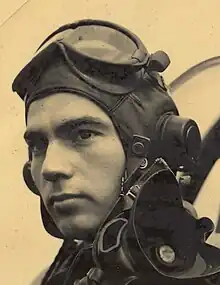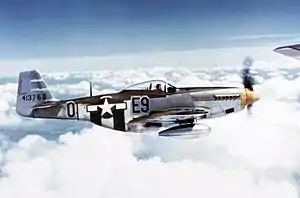William R. Beyer
William Rockafeller Beyer (July 5, 1923 - August 15, 2016) was an American flying ace during World War II, who was credited with 9 aerial victories.
William Rockafeller Beyer | |
|---|---|
 | |
| Nickname(s) | Bill |
| Born | July 5, 1923 Danville, Pennsylvania, U.S. |
| Died | August 15, 2016 (aged 93) Danville, Pennsylvania, U.S. |
| Buried | Odd Fellows Cemetery Danville, Pennsylvania, U.S. |
| Allegiance | United States of America |
| Service/ | United States Army Air Forces |
| Years of service | 1942–1945 |
| Rank | |
| Unit | |
| Battles/wars | World War II |
| Awards | |
Early life
Beyer was born in 1923 in Danville, Pennsylvania, to Carl Beyer and Lorraine Rockafeller, née Manning. He resided in Danville for most of his life and graduated from Danville Area High School in 1941.[1]
Military career
On January 21, 1942, he enlisted in the U.S. Army Air Forces and attended glider training before entering the Aviation Cadet Program in January 1943. On November 3, 1943, he was commissioned a second lieutenant and was awarded his pilot wings at Napier Field in Alabama.[2]
World War II

In April 1944, Beyer was assigned to the 376th Fighter Squadron of the 361st Fighter Group at RAF Bottisham in Cambridgeshire, England. Initially flying the P-47 Thunderbolts, the 361st FG converted to P-51 Mustangs in May 1944.[3]
Flying the P-51s, Beyer scored his first aerial victory on September 17, 1944, when he shot down a Bf 109. On September 27, while escorting bombers in the vicinity of Eisenach, his flight encountered a flight of Fw 190s attacking the bombers. In the aerial battle, Beyer managed to shoot down five Fw 190s, making him one of the 38 USAAF pilots to become an "ace in a day".[4][5]
On September 17, 1944, during the first day of Operation Market Garden, Beyer's squadron was intercepted by a flight of 15 Bf 109s near the German border with the Netherlands. In the resulting aerial combat, one of the P-51s was shot down by a Bf 109 piloted by German flying ace Klaus Mietusch; Mietusch in turn was shot down by Beyer, killing him as his Bf 109 crashed near Aldekerk, and thus crediting Beyer with his seventh aerial victory.[6]
On September 26, the 361st FG moved to RAF Little Walden in Essex, England.[3] He scored his last aerial victories of the war on November 26, when he shot down a Bf 109 and Fw 190, south of Uelzen.[7]
During the war, he was credited with a total of nine enemy aircraft destroyed in aerial combat.[8]
He returned to the United States in May 1945, and left active duty in November 1945.[2]
Later life
On April 12, 1945, Beyer married Elizabeth Josephine Pope. They had two daughters and a son, along with numerous grand and great-grandchildren.[1]
After leaving military service, Beyer moved back to Danville in 1951 and worked as an instrument mechanic at Merck & Co. for 33 years.[1]
In 2015, he along with other flying aces received the Congressional Gold Medal, in recognition of "their heroic military service and defense of the country's freedom throughout the history of aviation warfare."[9]
Beyer died on August 15, 2016, at the age of 93 and was buried at the Odd Fellows Cemetery in Danville.[1]
Aerial victory summary
| Date | Location | Number | Type |
|---|---|---|---|
| September 17, 1944 | between Hasselt, Belgium and Wesel, Germany | 1 | Bf 109 |
| September 27, 1944 | Eisenach, Germany | 5 | Fw 190 |
| November 2, 1944 | Aldekerk, Netherlands | 1 | Bf 109 |
| November 26, 1944 | Uelzen, Germany | 1 | Bf 109 |
| November 26, 1944 | Uelzen, Germany | 1 | Fw 190 |
- All information on enemy aircraft damaged and destroyed is from Stars and Bars.
Awards and decorations
| Silver Star[10] | |
| Distinguished Flying Cross[10] | |
| Air Medal with two silver and two bronze oak leaf clusters | |
| Army Good Conduct Medal | |
| American Campaign Medal | |
| European-African-Middle Eastern Campaign Medal with three bronze campaign stars | |
| World War II Victory Medal | |
References
- "William Rockafeller Beyer". Brady Funeral Home. 2016. Retrieved 2023-04-17.
- "William R. Beyer". Veteran Tributes. Retrieved 2023-04-17.
- "361st Fighter Group". Army Air Corps Museum. Retrieved 2023-04-17.
- "Air Force Historical Study 85: USAF Credits for the Destruction of Enemy Aircraft, World War II" (PDF). 1978. p. 22. Retrieved 2023-02-25.
- Beyer, William. "Combat Report (27 September 1944)". WWII Aircraft Performance. Retrieved 2023-04-17.
- Caldwell 1998, pp. 349–351.
- Beyer, William. "Combat Report (26 November 1944)". WWII Aircraft Performance. Retrieved 2023-04-17.
- "Capt. William R. Beyer". National Air and Space Museum. Retrieved 2023-04-17.
- "American Fighter Aces Receive Congressional Gold Medal". U.S. Mint. 2015-05-25. Retrieved 2023-04-17.
- "William R.Beyer Jr". Military Times. Retrieved 2022-04-17.
Bibliography
- Caldwell, Donald L. (1998). The JG 26 War Diary: Volume Two 1943–1945. London: Grub Street. ISBN 978-1-898697-86-2.